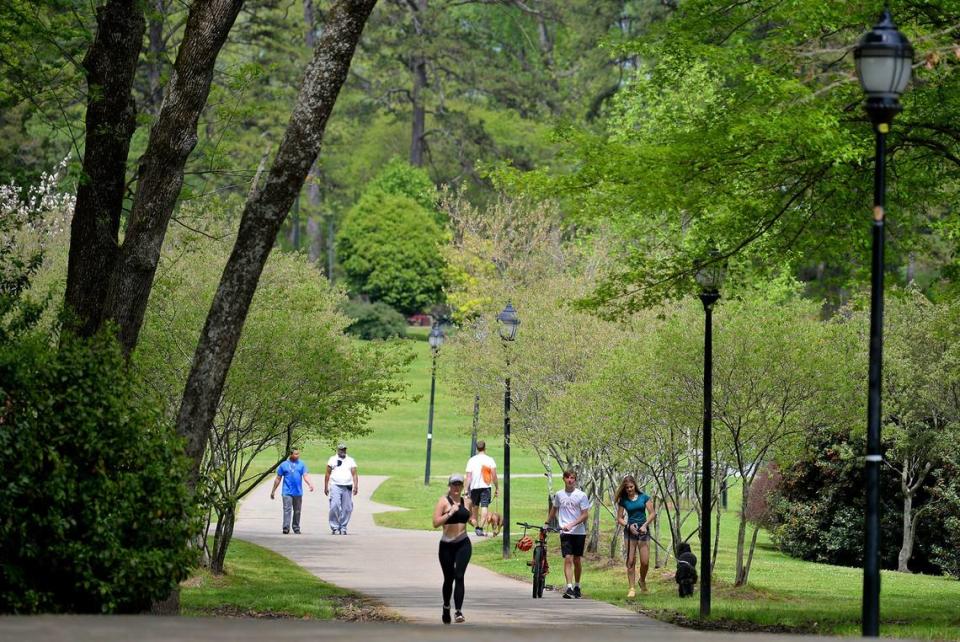Meck loosens COVID restrictions. Here’s what changes at county parks, Aquatic Center.
Coronavirus-related restrictions at Mecklenburg County parks will ease next week — just days after the governor’s modified stay-at-home order lifts as a result of improved health trends.
Since Jan. 12 in and around Charlotte, parks, greenways and nature preserves have closed at dusk to prevent people from gathering and potentially spreading the virus.
The expiration of Mecklenburg Public Health Director Gibbie Harris’ directive means more outdoor Park and Recreation service will resume on Monday, county officials announced Thursday morning. Tennis courts and other fields will have lighting during “normal hours,” the announcement says, coming weeks after some county commissioners and dozens of residents urged Harris to be more lenient on outdoor activities.
“While the number of cases has decreased and vaccine has become available, that does not mean we are out of the woods yet,” Harris said in a statement. “Everyone must continue to practice the 3 Ws and avoid gatherings with individuals they do not live with to continue the improvement in metrics and keep our community healthy and safe.”
The Mecklenburg County Aquatic Center will open by reservation only, along with camping at McDowell Nature Preserve, officials said. Park and Recreation will accept reservations for athletic fields, plus indoor and outdoor shelters, as long as capacity requirements are met. Gov. Roy Cooper’s latest mass gathering limits are 25 people indoors and 50 people outdoors.
The SkatePark at Naomi Drenan Recreation Center will also reopen. Senior centers remain closed to the public, and in-person tax payments are still suspended at the Valerie C. Woodard Center.
The Charlotte Mecklenburg Library is expected to announce expanded services in the next few days, a spokeswoman said.
Harris’ public health directive had largely echoed a directive from Dr. Mandy Cohen, secretary of the North Carolina Department of Health and Human Services. It reinforced preventive measures that health officials have encouraged since the start of the pandemic, including avoiding crowded venues, limiting nonessential activities, getting tested for COVID-19 and complying with contact tracing efforts to quell more virus outbreaks.
But when announced, Harris’ directive caused confusion and angst — including for K-12 public and private schools and universities.
“Utilize full-virtual options for work, school, and any other activity where in-person activity is not required,” the directive read. Charlotte-Mecklenburg Schools followed that guidance and extended its remote learning period to Feb. 15.
Mecklenburg’s directive was initially designed to span three weeks, from Jan. 12 to to Feb. 2.
Harris later modified and extended the directive to the end of the month, but she removed the language about virtual learning. The decision, Harris said, was partially based on research from the Centers for Disease Control and Prevention that supports in-person learning for K-12 students as long as safety measures, such as masks and social distancing, are observed.
COVID cases by Charlotte ZIP codes: Lowest rates in months. Here’s the map.
COVID, vaccine numbers
Coronavirus trends in and around Charlotte have steadily improved since January, after holiday celebrations promoted a deluge of infections, hospitalizations and deaths.
On average, Mecklenburg’s is adding about 275 new cases each day, according to a Charlotte Observer analysis of state public health data. That is a nearly 62% decrease compared to this point last month. The positivity rate and hospitalizations are also nearing pre-Thanksgiving levels.
Testing demand has plummeted following Christmas, but testing is still widely available and free throughout Mecklenburg, Harris said. People should still get tested once they’ve been in large group settings, the health director said.
Harris has warned the public must stay vigilant as new, more transmissible coronavirus variants circulate in the community.
The virus could also have more opportunities to spread at establishments gaining flexibility with new state regulations, including bars allowed to reopen at 30% capacity and indoor arenas at up to 15% capacity. Harris pleaded with residents and businesses to stay safe this weekend, saying the responsibility cannot fall solely on law enforcement agencies or the county’s COVID-19 ambassadors.
“We want this to work. We want the openings to be something that is sustainable as we move forward,” Harris said. “But we need our numbers to continue to move in the right direction, and that means we need our community to continue to do the right thing.”
Even residents vaccinated against COVID-19 must keep wearing masks and practicing social distance, among safeguards, health officials say. Just over 100,000 first doses have been administered in Mecklenburg as of Wednesday, according to N.C. DHHS. More than 56,000 second doses — equating to 5.1% of the county population — were deployed.
Dr. Meg Sullivan, the county’s medical director, said she is optimistic vaccine supply could increase once Johnson & Johnson’s one-dose regimen is authorized for emergency use. About 6,000 people are on the county’s vaccine waitlist, with the vast majority falling under Group 3 for educators.
“If you have an opportunity to get a vaccine, you should get a vaccine,” Sullivan said, stressing vaccinations so far have resulted in mostly minimal side effects.
The county has logged 95,952 cases since the start of the pandemic, the state reported Thursday afternoon.
Patients want primary care doctors to give vaccine but find scant supply, NC doc says


